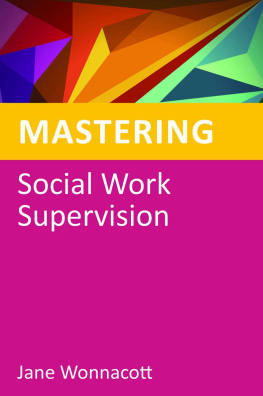SAGE Publications Ltd
1 Olivers Yard
55 City Road
London EC1Y 1SP
SAGE Publications Inc.
2455 Teller Road
Thousand Oaks, California 91320
SAGE Publications India Pvt Ltd
B 1/I 1 Mohan Cooperative Industrial Area
Mathura Road
New Delhi 110 044
SAGE Publications Asia-Pacific Pte Ltd
3 Church Street
#10-04 Samsung Hub
Singapore 049483
Rick Hood 2018
First published 2018
Apart from any fair dealing for the purposes of research or private study, or criticism or review, as permitted under the Copyright, Designs and Patents Act, 1988, this publication may be reproduced, stored or transmitted in any form, or by any means, only with the prior permission in writing of the publishers, or in the case of reprographic reproduction, in accordance with the terms of licences issued by the Copyright Licensing Agency. Enquiries concerning reproduction outside those terms should be sent to the publishers.
Library of Congress Control Number: 2017955328
British Library Cataloguing in Publication data
A catalogue record for this book is available from the British Library
ISBN 978-1-4739-9380-8
ISBN 978-1-4739-9381-5 (pbk)
Editor: Kate Keers
Editorial assistant: Talulah Hall
Production editor: Katie Forsythe
Copyeditor: Mary Dalton
Proofreader: William Baginsky
Indexer: Gary Kirby
Marketing manager: Camille Richmond
Cover design: Wendy Scott
Typeset by: C&M Digitals (P), Ltd, Chennai, India
Printed in the UK
About the Author
Rick Hoodis a registered social worker and Associate Professor in the Department of Social Work and Social Care at Kingston University and St Georges, University of London. Rick has over ten years experience of statutory social work, mainly in the fields of child protection and looked after children. His interests lie in the application of systems ideas to people-centred services, particularly in relation to children and families. He has undertaken research into interprofessional expertise, complexity in child protection work, relationship-based practice, performance indicators and inspection in childrens social care. His work has been published widely in the areas of interprofessional care and social work.
Introduction: What is Complexity?
Chapter Summary
This introductory chapter will define and explain the concept of complexity. It starts with a discussion of what makes social work complex and the difference between complex and complicated problems. Characteristics of complex systems are then explained along with some of the main principles of complexity theory. The links between concepts of complexity and risk are discussed. The chapter concludes with a prcis of the structure and layout of the book.
Introduction
Social workers are constantly aware of complexity. Their professional remit, after all, is the messy reality of life. To practise as a social worker is to deal with the uniquely problematic interface between each individual and the world around them. Most social workers would say their work is far from predictable and often bears scant resemblance to academic models and theories. Experience teaches them to accept uncertainty and to tolerate risk without becoming panicked or paralysed. Social workers are regularly asked to find solutions to intractable situations, navigate ethical and legal dilemmas, and provide services to those who do not want them. To accomplish these and many other tasks, they draw on an eclectic body of knowledge that stretches beyond their own academic discipline to incorporate elements of psychology, sociology and bio-medical science, as well as the law. So one might indeed say that social work is a complex undertaking!
But what does complexity really mean? And is the complexity of their work something social workers need to know more about? These two questions underlie the topics covered in this book. Its focus is on thinking about complexity in practice rather than explaining scientific and mathematical theories in great detail. However, it will be important for readers to grasp some of the basic principles of complexity in order to understand fully the connections and applications made in later chapters. This introductory chapter will therefore seek to define and explain complexity, starting with conventional understandings of the term before exploring insights from theories of complex systems. The chapter concludes by outlining the topics covered in the rest of the book.
What do we Mean by Complexity?
Conventional understandings of the term complex tend to stress the idea of difficulty. However, when we look more closely at how the term is used, we can begin to see what it is about complexity that makes things difficult.
Wicked problems
Most social workers will be able to highlight certain pieces of work that they regard as especially complex. When practitioners are asked what makes their cases complex, often they point to the difficulty of solving the problem, or more likely the set of problems, with which they are presented. Theres so much going on its hard to know where to start is one way of paraphrasing this sentiment. It could be argued that social workers in these cases find themselves confronted with what Rittel and Webber (1973) call wicked problems. According to Hood et al. (2016a) such problems are characterised as follows:
- They have no definitive formulation
- They relate to multiple issues, so it may be difficult to recognise when an end-point has been reached
- They have a unique configuration, so a solution may not work in other cases
Arguably, all problems in social work conform to this description; some situations just make us more aware of their wicked characteristics than others. This is an important point that we shall return to later in the chapter.
Complex or complicated?
One way of understanding complex problems is to think about what makes them different from a complicated technical problem. An example of a technical problem that many people have experienced is a car engine that refuses to start. Unless it is something relatively straightforward, such as a dead battery, a car engine is too complicated for most people to repair on the spot. They will need the help of a car mechanic. The mechanic should be able to obtain all the necessary information to understand what is wrong with the engine, and formulate what needs to be done. There is a clear measure of success and an end-point to the intervention, i.e. the car should start and not cut out. If the solution works, then it should apply to all similar problems in the future. These points all differ fundamentally from the characteristics of wicked problems that were identified above.
What is it about the car engine that makes it a complicated rather than a complex problem? In essence, an engine is an intricate assembly of components, whose properties and connections to each other are largely determined by the laws of physics. The individual parts of an engine do not move independently or decide how to interact with each other. If they change the way they behave, it is through wear and tear or accidental damage rather than because their intentions have changed or because of an unconscious shift in attitudes. In other words, car engines cannot feel, think or reflect on what they do. They can neither adapt to their environment nor evolve new ways of performing their function. All this means that an engine should behave predictably as long as our theoretical model of how it works is accurate
















